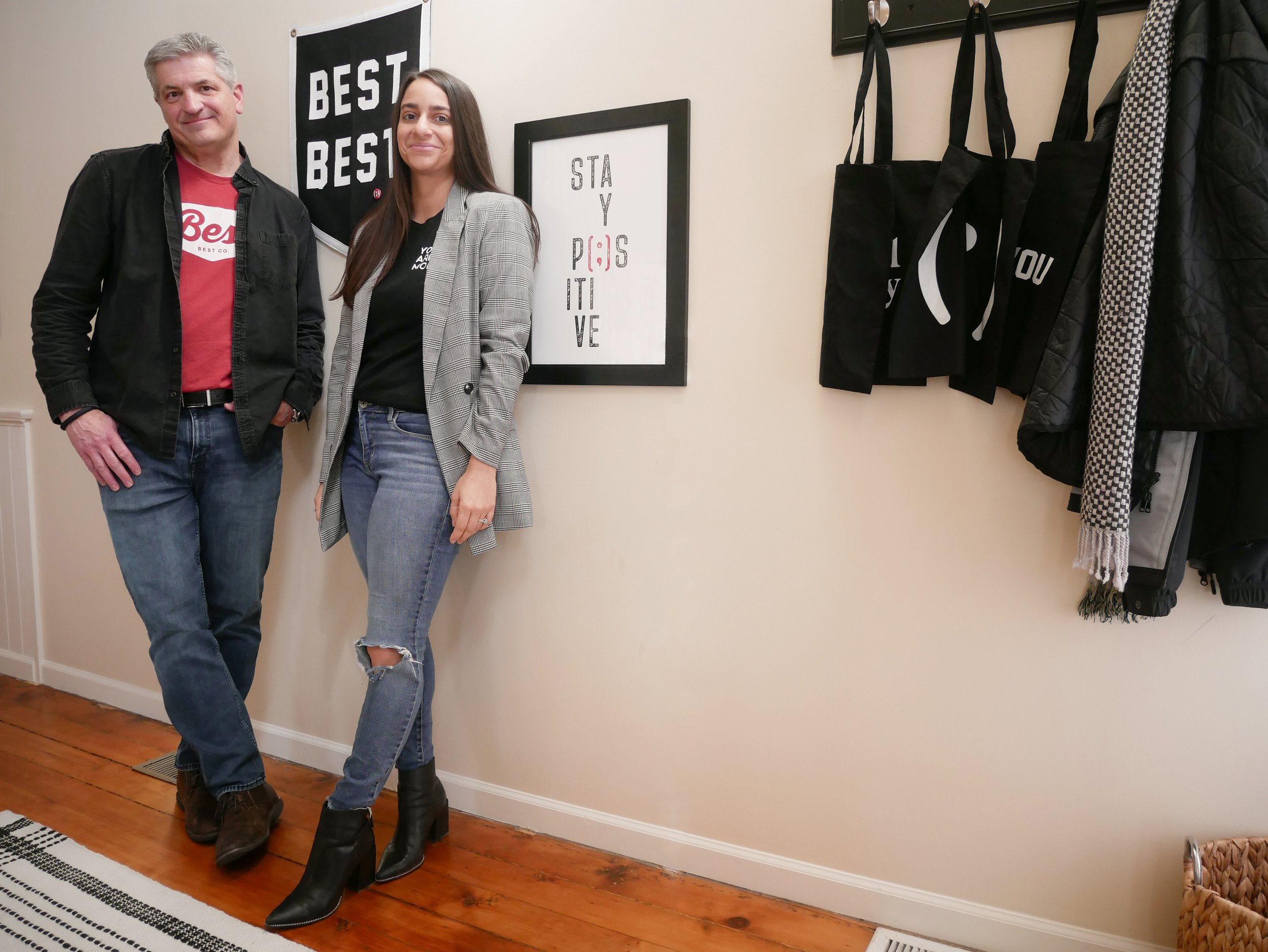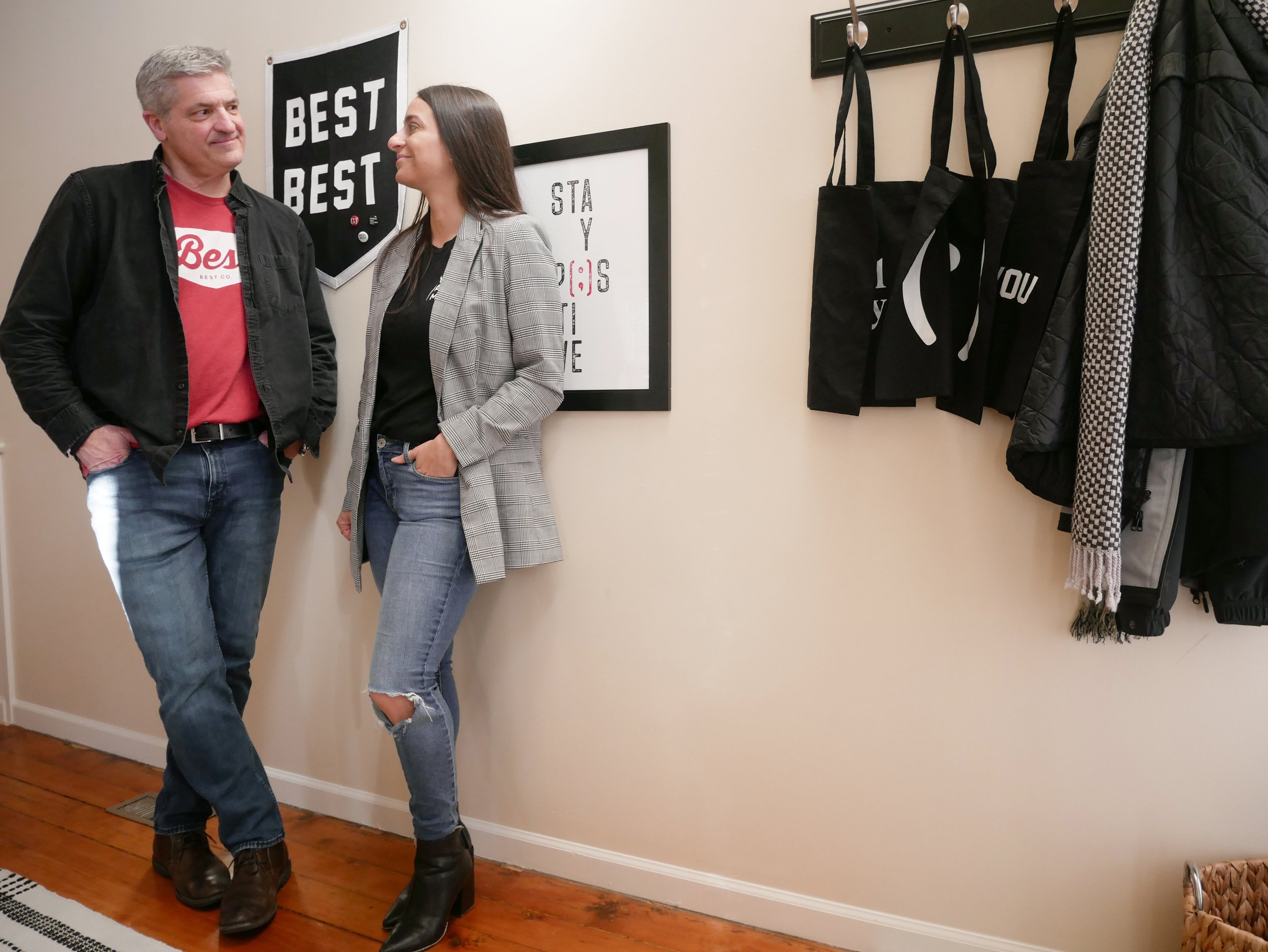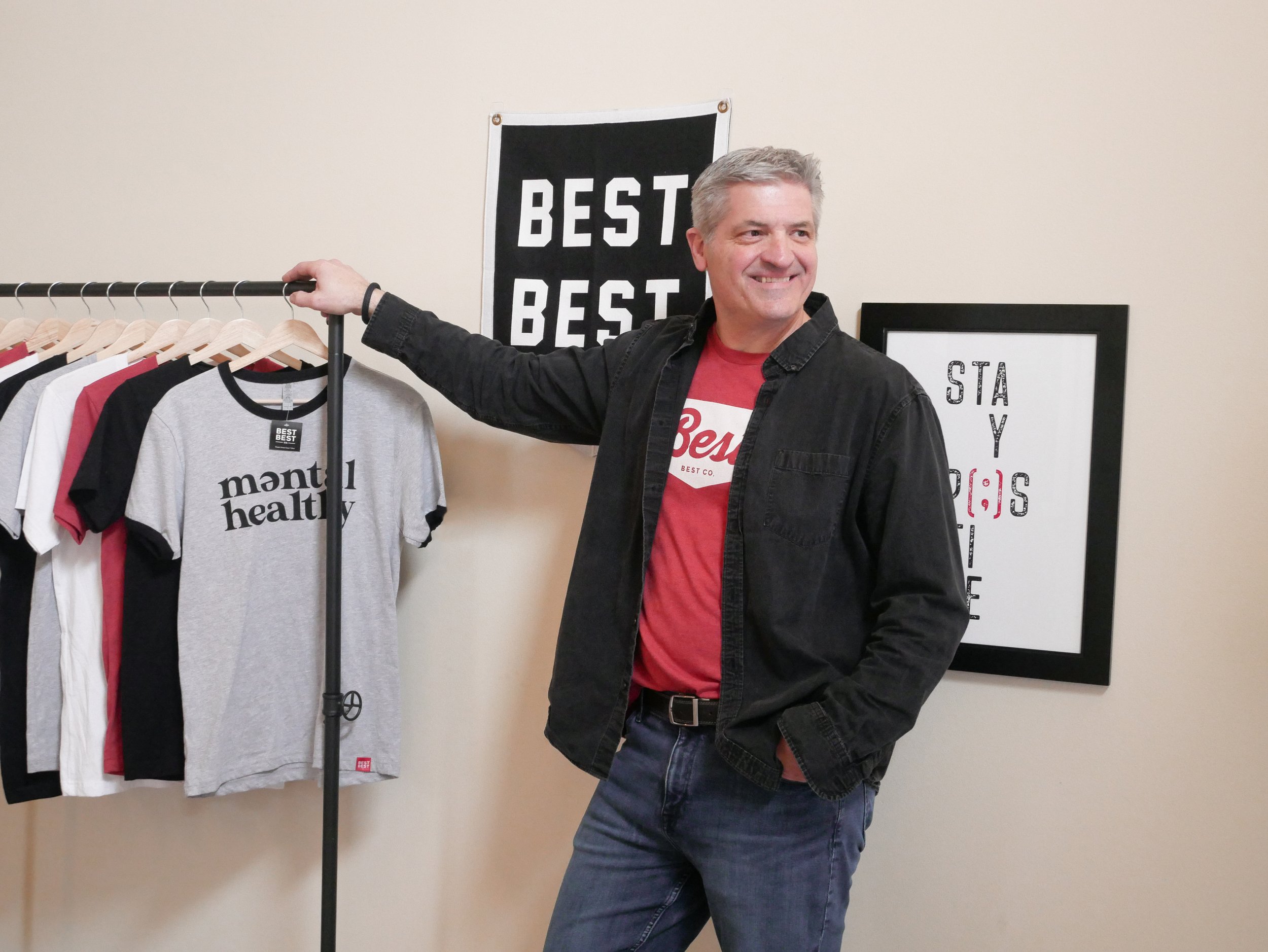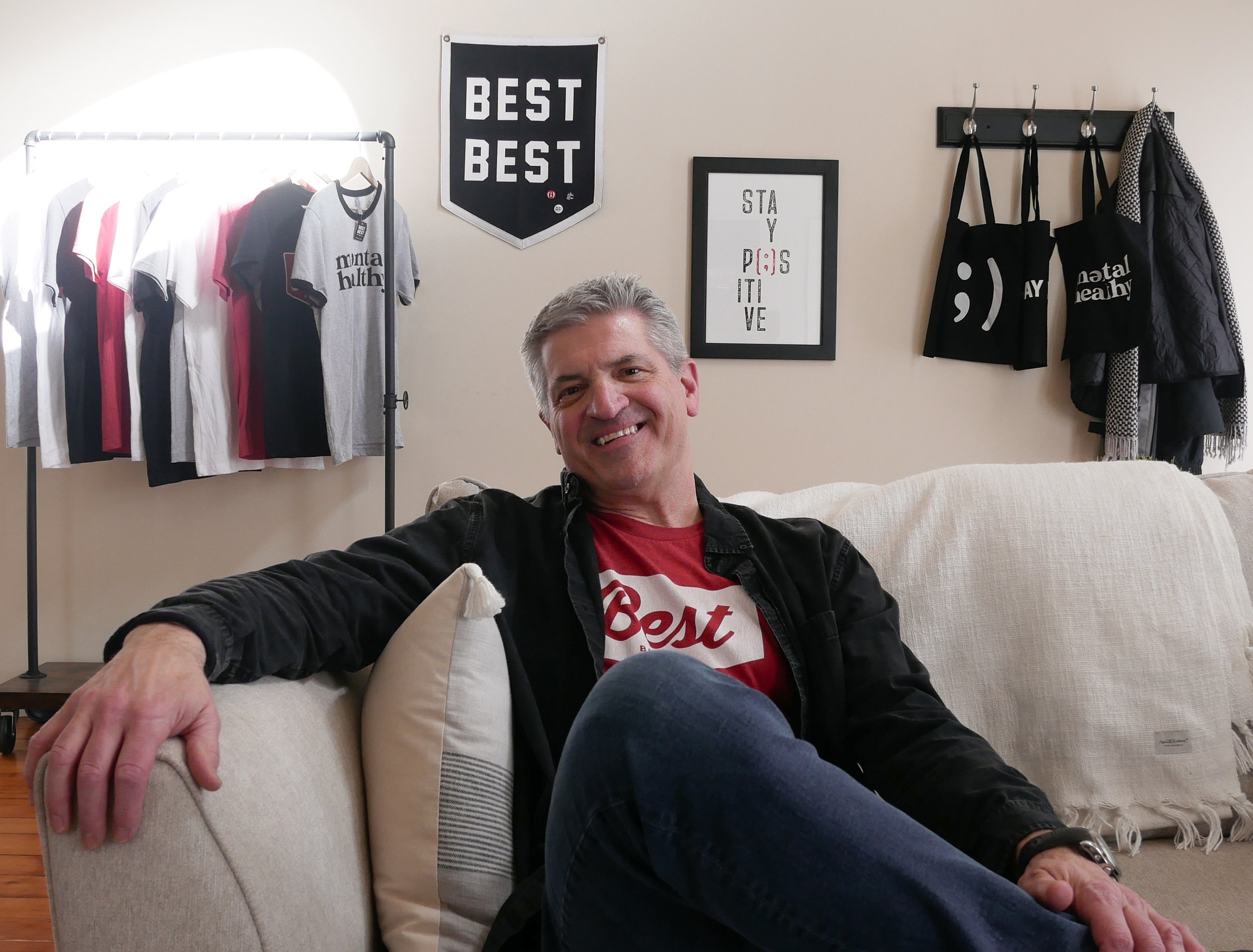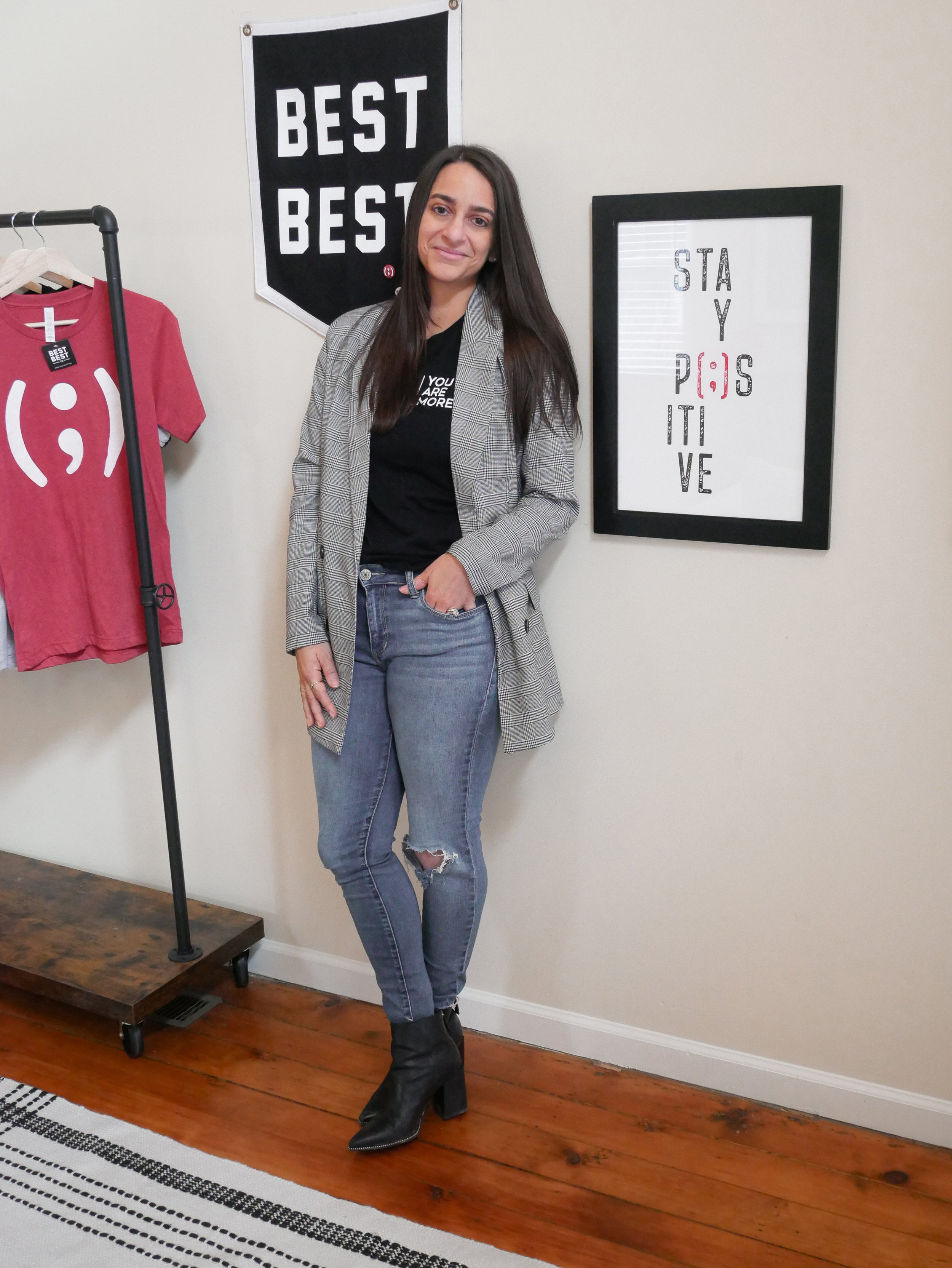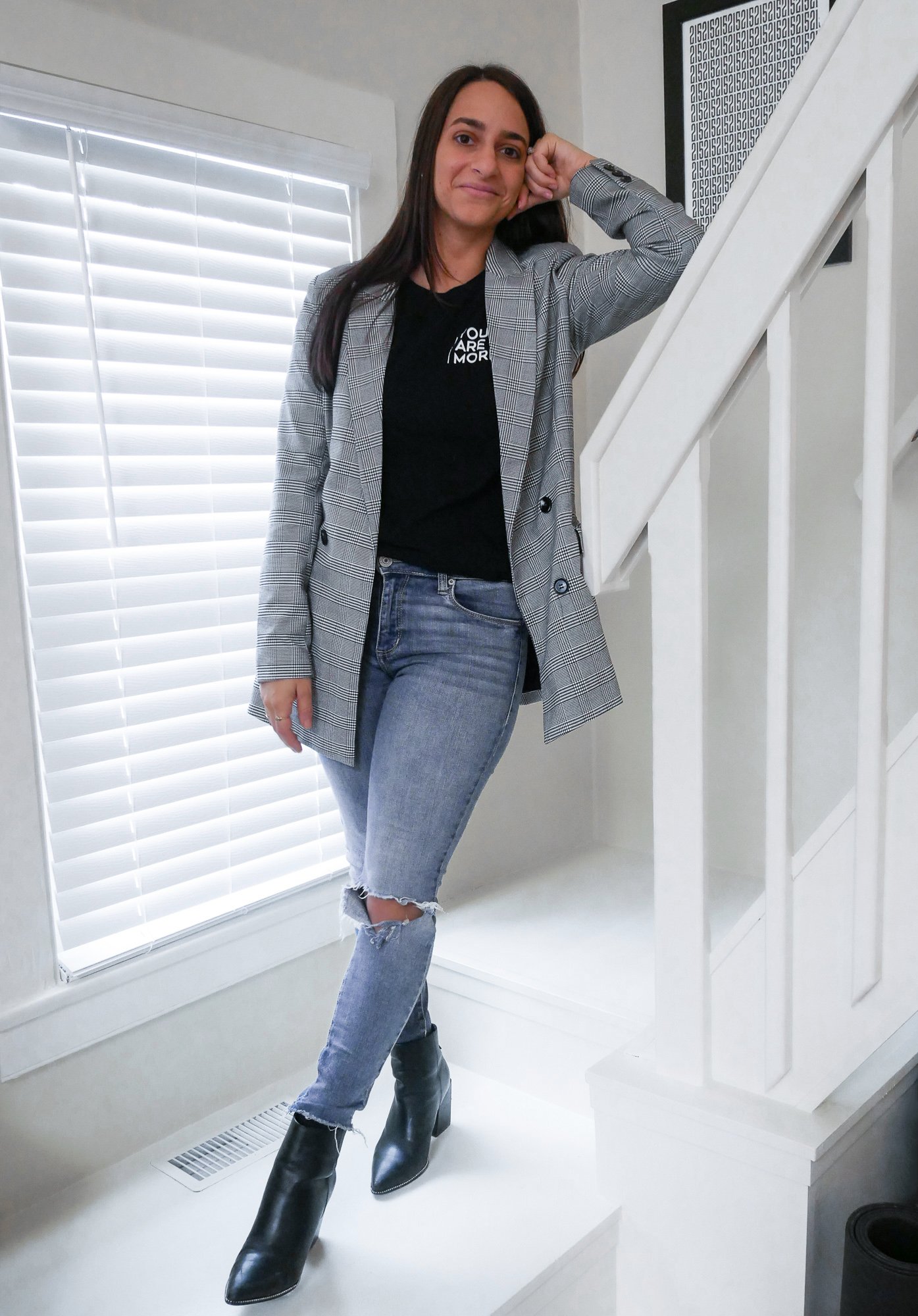Herb Griffith &
Jackie Van Alstin:
Best Best Co
“By sharing our personal stories, it allows us to have open and honest conversations with people about the struggles with mental health we’ve all felt in life, one way or another. Being able to find that common ground with a stranger while building awareness around mental health issues throughout the community is a very powerful thing. It helps us all remember that no one is alone.”
Herb Griffith
NAMI: Have you ever had any mental health struggles?
HG: The first time I recognized signs of depression in myself was about 14 years ago. I had to make the painful yet necessary decision to close a business that I had been running for over 25 years. It was an extremely difficult decision that affected the lives of 20 employees and their families and took over a year and a half to complete. During that time, I was under immense pressure physically, mentally, and financially. I couldn’t sleep. I had to make some huge personal sacrifices. It was emotionally draining and physically exhausting. Once the process was finally complete, I really couldn’t do much for first few months. I felt like a shell of myself, just going through daily motions, not sure what I should or even could do next with my life. So much of my identity had been wrapped up in that role for so long. Finally, a friend said to me, “I think you’re depressed; you should think about seeing somebody.” And even though I knew she was right, the self-imposed stigma surrounding treatment kept me from seeking the help I now know I desperately needed. I’ve always had a difficult time accessing and understanding my own emotions and feelings. Luckily, I now have a very close friend who has really helped shine some light on that area of myself. I still struggle from time to time with depression, but I feel like I’m much better equipped to recognize it and verbalize it to myself, and others close to me.
NAMI: What forms of mental health-related stigma have you observed or run into personally? How do you combat stigma?
HG: The first time I realized I was suffering from depression, I wasn’t ready or able to admit to myself that I was struggling, and that I needed help. I self-imposed that stigma and denied myself the opportunity to seek the treatment I now know I needed. My first instinct has always been to “deal” with my emotional and mental struggles internally, which really just meant I buried them and tried my best NOT to think about them. Thankfully, I’ve been fortunate to have a close friend who has helped me to realize that denying those feelings and thoughts is not a healthy way to live. I think in order to combat stigma, you have to first recognize it in yourself, at least I know I had to. Now I find that simply having a conversation with someone about mental health is the best way to open that door. I’ve learned that no one is immune to mental illness, everyone can relate, and everyone has a story about how it has touched their life or that of a loved one.
Jackie Van Alstin
NAMI: Have you ever had any mental health struggles?
JV: Yes, I have struggled with depression, self-harm, suicidal thoughts, anxiety and PTSD as a result of being sexually abused throughout my childhood. I spent most of my life hiding my pain and suffering, partly to protect my loved ones but mostly because I did not want to face the trauma I endured. I let the shame consume me, acted out, and stopped caring about myself and others. I hated my body and blamed it for what i'd been through, so I didn't respect it or myself.
JV: Whenever I experienced flashbacks and nightmares, my whole body would shake. My chest would feel so heavy as if I was being buried with rocks and could not breathe. I’d feel overwhelmed by fear. It would feel so real that I’d feel like I was reliving past trauma. I’d constantly think “I can't live like this forever. Why can't I just be normal?” But is there really such a thing as normal?
JV: There have been many times when I felt like life wasn’t worth living. At one point, it became so overwhelming that I tried to take my own life. Luckily, I did not succeed and in that time I got the professional help I needed to continue on. Although I do still have PTSD, flashbacks, and nightmares, they are significantly less. I've learned to accept I will have those challenges in life but continue to work on myself and my mental health on a daily basis because I have learned life IS worth living.
NAMI: How have you healed and grown from your experiences?
JV: I believe it is extremely important to go at your own pace when it comes to healing. That being said, it's been a long healing journey for me, and I will continue to heal every day. Growing up, dance was the biggest outlet for me. It gave me a way to heal by expressing all my emotions I had built inside and it was powerful knowing I had control of my own body. Being abused you lose that connection with your body, and I think it's wildly important to find ways to reconnect, as difficult as it is. Dance certainly helped me.
JV: I have spent a lot of time giving myself compassion and learning to love and believe in myself. I constantly remind myself my abuse was not my fault and continuously let go of the shame. In my own journey to healing and empowerment, I found that writing and sharing my story helped me further process my emotions. In April 2022 I publicly shared my story for the first time. Although it was scary and I felt like I had stamped the words "sexually abused" on my forehead for all the public to see, it was also powerful to own my trauma instead of it owning me. Sharing my story opened the door for others to share their story and create that safe space of not feeling alone. I have grown by speaking up for myself, being more open with my mental health struggles and the drive to always continue down the healing road. Just two weeks ago I signed up to attend my first healing webinar with other victims of childhood sexual abuse and my future goal is to attend a retreat to further my healing journey.
NAMI: How do you protect your mental health? What forms of self-care do you practice? What keeps you balanced?
JV: I have worked hard to love myself and build a safe space in my life for me to put my mental health first. I've become more open to my loved ones about my mental health struggles and what support I need. I’ve learned to say no when I need to protect my mental health. It is okay to say no! I have also been on a journey the last year of limiting and avoiding alcohol because I have previously used it to dull my pain in certain situations, which only made it worse. Kombucha, N/A drinks and mocktails are all the rage nowadays anyway. My self-care practices are saying positive affirmations daily, meditation, physical exercise, and breathing techniques. Staying connected with my body and mind in positive ways helps me remember I am in charge. When I’m triggered from my abuse, I take a deep breath and focus on comforting things around me then say 3 things I am grateful for to bring me back to my safe space in the present moment. What keeps me balanced is giving back and helping others. I've always had a strong drive to want to make an impact on others who may be struggling. I wanted to use my design skills to create something that makes others feel good, powerful, and open the conversation around mental health while also giving back to a local organization (NAMI Rochester) that helps provide professional support.
JV: I want the world to know that a history of abuse or mental health struggles does not define a person. There is much more to a person than that. Which inspired Best Best Co's "You Are More" T-shirt. By reclaiming my power, I am learning to say and believe I am strong, I am worthy, and I can love myself. As a result, I quit holding myself responsible for the actions of my abuser. I will constantly continue to rebuild because I will not be my traumas prisoner.
Herb & Jackie
NAMI: Tell us about Best Best Co.! How did it come to be?
HG&JV: Best Best Co is a locally designed and produced branded apparel company right here in Rochester that’s all about spreading the power of positivity and the energy that’s generated when we strive to become the best, best versions of ourselves. All our t-shirts, totes, posters and pins are designed and produced in-house and carry a common message of hope, mindfulness, positivity, and trying our best to live what we call a “mental healthy” lifestyle.
HG&JV: We were co-workers for a few years and had collaborated on several design projects during that time, so we knew we shared a common vision and aesthetic in our work. But what really brought us together was the experience of significant loss in both our lives at exactly the same time. It was at that point we realized how important we were to each other as a mutual support system which, in turn, created a safe space for deeper conversations. We had been discussing ideas for a startup we could launch together, and both felt strongly it had to be something that could help make a positive impact on the lives of other as well as our own. We knew we had both been that source of positivity for each other during some rough times, so we thought why not find a way to share that feeling with others who may be struggling?
HG&JV: Our mission really is to help generate an awareness around mental health issues that resonate so deeply with us personally, as well as with countless others. We also wanted a way to directly support and collaborate with those organizations within the mental health community who work so hard to inspire change and make a difference for those in need. That's why 10% of all Best Best Co profits go directly to NAMI Rochester to help support their vital mental health services and programs.
NAMI: Has Best Best Co. created opportunities to talk about mental health? What has your experience been when you interact with the community?
HG&JV: One of the most important parts in building that awareness is just having conversations with people about their experiences. We all know mental health issues touch each and every one of our lives in countless ways. But, when we start talking to people about Best Best and what inspired us to start it, it almost gives them a friendly doorway to walk through and a space to talk about their own story. When we talk with people at events about Best Best Co. we explain the story behind our brand and why mental health awareness is so important to us. By sharing our personal stories, it allows us to have open and honest conversations with people about the struggles with mental health we’ve all felt in life, one way or another. Being able to find that common ground with a stranger while building awareness around mental health issues throughout the community is a very powerful thing. It helps us all remember that no one is alone.
HG&JV: We are fortunate to have a very active and engaged mental health community in Rochester, so we hoped our message would be well received. For us, it's all about spreading the power of positivity while supporting NAMI Rochester's access to lifesaving resources that can help someone live a mental healthy lifestyle. So far, the community has been very supportive of our brand and our commitment to making a difference. If our message gets through to just one person, we'll have been successful.

